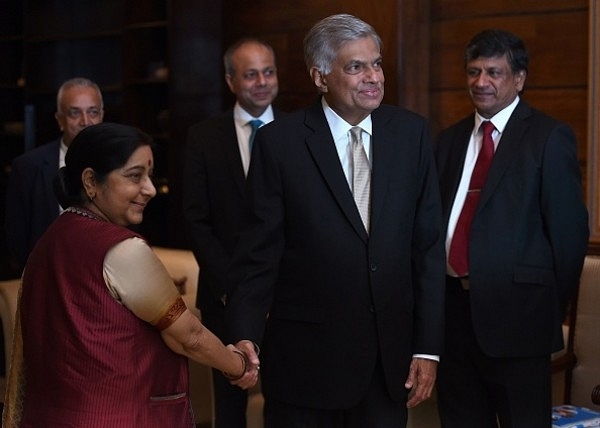World
Security, Freedom Of Navigation Focus At Indian Ocean Conference 2017: Highlights
- The broad message emerging from the Second Indian Ocean Conference is the need for security and unrestricted navigation in the Indian Ocean region.
- Here are the highlights of some of the speeches delivered at the conference.

Sri Lanka’s Prime Minister Ranil Wickremesinghe shakes hands with Foreign Minister Sushma Swaraj (L) during the opening of the two-day Indian Ocean Conference 2017 in Colombo. (ISHARA S. KODIKARA/AFP/Getty Images)
Presidents, prime ministers, foreign ministers, foreign secretaries, retired and serving naval officers, strategic affairs experts and scholars from more than 25 countries attended the two-day Second Indian Ocean Conference organised by the India Foundation at Colombo that ended on 1 August.
The conference facilitated the emergence of unanimity among all the countries of the Indian Ocean region as well as the stakeholders in the vast ocean that the Indian Ocean needs to be secured and kept free for unrestricted navigation. All countries also agreed on the need to formulate a rule-based architecture to regulate shipping, exploration and other activities in the Indian Ocean.
All the countries, including the United States, Australia, France, Germany, India, Sri Lanka, Indonesia, Bangladesh, the United Kingdom, Afghanistan, Singapore, Seychelles, Mauritius, Malaysia, Japan and Vietnam, felt that the Indian Ocean has to be guarded against going the way of the South China Sea. Claims and hegemonistic assertions by the more powerful nations in the Indian Ocean region need to be guarded against, and respect for international laws and conventions needs to be imbibed by all.
The nations also agreed that piracy, trafficking in drugs and humans, illegal fishing, unscientific exploration and extraction of oceanic resources and the spread of terrorism aided by some state actors in the region were the biggest challenges facing countries in the Indian Ocean region.
Free trade and commerce based on fair practices and transparency are key to progress and prosperity in the region and that, in turn, is the only way to promote peace, said the leaders of the countries that participated in the conference.
Highlights
Bangladesh Commerce Minister Tofail Ahmed
The prime challenge facing countries in the Indian Ocean region is terrorism. Anti-piracy and counter-terrorism are shared responsibilities.
Poverty in one country adversely affects the overall security situation in the region, and cooperation in trade and promotion of intra-regional investment is the only way to eliminate poverty.
Countries of the Indian Ocean region need to formulate a coordinated approach to tackle natural disasters since 70 per cent of the world's natural disasters occur in the Indian Ocean region.
Mauritius Marine Resources & Shipping Minister Premdut Koonjoo
Unless the threat to maritime security in the Indian Ocean region is addressed, there can be no peace and prosperity in the region.
Just as intensive international cooperation ended piracy off Somalia, similar cooperation and coordination is necessary to tackle trafficking in humans and drugs (through the Indian Ocean) that is posing a severe threat to all countries in the region.
Japan Vice Minister for Foreign Affairs Iwao Horii
All countries must stand firm to uphold freedom, democracy and the rule of law in the Indian Ocean region.
North Korea is now the biggest threat to peace in the Indian Ocean region. A peaceful settlement of all disputes in the South China Sea, based on respect for international laws, is necessary. It is important for all countries to raise their voices collectively and oppose all activities that threaten the rule of law.
Sustainable development based on free trade, transparent procedures and an equitable approach is necessary for progress and prosperity in the region.
Japan will provide capacity-building assistance to littoral states of the Indian Ocean to tackle terrorism, trafficking and piracy.
Vietnam Assistant Minister of Foreign Affairs To Anh Dzung
The Indian Ocean region is vulnerable to many security challenges, foremost among them being piracy, terrorism and natural disasters. Coercion by powerful states, violation of international laws and conventions, organised crimes and epidemics are other threats to peace in the region.
Sri Lanka Foreign Minister Tilak Marapana
A rule-based order for the Indian Ocean region is necessary. Like Sri Lanka, all littoral states of the Indian Ocean should adopt a ‘blue-green’ development strategy that incorporates environment-friendly practices while promoting the blue economy.
Sri Lanka Foreign Secretary Prasad Kariyawasam
Need to promote people-to-people contacts among countries in the Indian Ocean region and promote an ‘Indian Ocean region’ identity among citizens of the littoral states.
Introducing ElectionsHQ + 50 Ground Reports Project
The 2024 elections might seem easy to guess, but there are some important questions that shouldn't be missed.
Do freebies still sway voters? Do people prioritise infrastructure when voting? How will Punjab vote?
The answers to these questions provide great insights into where we, as a country, are headed in the years to come.
Swarajya is starting a project with an aim to do 50 solid ground stories and a smart commentary service on WhatsApp, a one-of-a-kind. We'd love your support during this election season.
Click below to contribute.
Latest